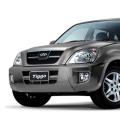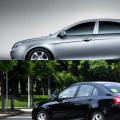In this section, we will analyze the algorithm of how to correctly select engine oil for your Volkswagen Polo, Beetle, Golf, Jetta, Passat, Phaeton, Sirocco, Turan, Sharan, Tiguan, Tuareg, Cuddy, Bora, Vento, Crafter, Multiven, Transporter, Caravel, T1, T2, T3, T4, T5, T6, LT and others. And it does not matter whether it is TSI, TDI or CLJ, ordinary aspirated or "turbodiesel", in this article you will find answers to almost all questions about the correct selection of oil for your swallow!
So, in a nutshell, how to quickly and without any special difficulties pick up oil of ANY brand in your Volkswagen, and of course, using the example of our profile product TM "LUKOIL".
Also, a new, well-forgotten old, but effective picture of the algorithm for determining the tolerance of your Volkswagen will come to the rescue.

SELECT THE RIGHT LEVEL OF QUALITY
That is, to determine the stock of properties of engine oil that is presented to it by the car manufacturer (of course, it will be more correct to find out or the operating instructions for your Volkswagen, therefore we strongly recommend that you arm yourself with a manual, which, as a rule, lies in the glove compartment;) But if the latter was lost, then the owners of Volkswagen, Seat, and Audi were frankly out of luck, since, unlike Skoda, getting access to the technical documentation of a particular car is quite an expensive pleasure)
VW 501.01 / 505.00 -
VW 500.00- created for gasoline engines, is relatively consistent with ACEA A3-96 and is outdated.
VW 501.01(covers VW 500.00) - intended for gasoline engines, relatively corresponds to ACEA A2.
VW 505.00- designed for diesel engines incl. equipped with a turbine, relatively complies with ACEA B3.
VW 502.00 / 505.00 - by clicking - download the list of officially approved oils according to this admission
VW 502.00(covers VW 505.00 and VW 501.01) - intended for gasoline engines, relatively corresponds to ACEA A3.
VW 505.00 - see above.
Screenshot example

VW 502.00 see above
VW 505.00 see above
VW 505.01- designed for diesel engines equipped with a turbine with a pump-injector injection system, can comply with both ACEA B4 and ACEA C3.
Screenshot example

Surprisingly, at the moment, there are only four officially approved oils for it :), and this is due, first of all, not to the uniqueness of the tolerance, but to its low demand, since basically VW 504.00 / 507.00 exceeds and replaces it with the exception of rare cases * (see below)
VW 503.00(covers VW 502.00) - intended for gasoline engines produced from 05/1999 with an extended drain interval. Exceeds the requirements of 502.00 (but has low level HTHS (2.9 mPa / s - i.e. dynamic viscosity at 150 °), therefore it is recommended not for all types of internal combustion engines, but only for those produced since May 1999).
VW 506.01- designed for diesel engines manufactured from 05/1999 with extended drain intervals, equipped with a pump-injector injection system.
Screenshot example

VW 504.00(covers VW 503.01, VW 503.00, VW 502.00, VW 501.01, VW 500.00) - designed for gasoline engines, with an extended drain interval (+ particulate filter). Relatively compliant with ACEA A3 (has a standard high-temperature viscosity HTHS ≥ 3.5 mPa / s)
VW 507.00(covers VW 505.00, VW 505.01, VW 505.00, VW 506.00, VW 506.01) - designed for diesel engines with extended drain intervals, equipped with a pump-injector injection system, including those equipped particulate filter... Can meet both ACEA B4 and ACEA C3 (has a standard high temperature viscosity HTHS ≥ 3.5 mPa / s)

* IMPORTANT VW 507.00 overlaps VW 506.01 for all engines except R5 and V10 TDI, for which it is recommended to use oils with VW 506.01 approval. By the way, for those who like to speculate about the fact that 507.00 does not replace 506.01 for all other engines, we give statistics: - officially approved oils at 504.00 / 507.00 at the beginning of 2018 - about 290 pcs, officially approved at 503.00 / 506.01 ~ about 4 pcs Do you really think that the Titans of the Petroleum Industry are not able to produce and add to their range 1 motor oil with 1 Volkswagen approval and viscosity 0w-30? For which, as a rule, they are lumped at 3 prices expensive on store shelves (because of its alleged "uniqueness") :), or is the demand for them not so great ...?
B) ACEA class and API
Compliance issue class ACEA and API is more of a secondary importance, since the instructions often contain a postscript like this - “If the above oil (approved according to VW approvals, and not the original one, as negligent dealers often interpret it) is not available, then in emergency other engine oil can be added. To avoid damage to the engine, before next replacement oil is allowed to fill up to 0.5 liters of engine oil that meets the following specifications: - for gasoline engines: ACEA A3 / ACEA B4 or API SN, (API SM); - for diesel engines: ACEA C3 or API CJ-4. "
SELECT THE RIGHT VISCOSITY
It is relevant for cars of past generations, since modern tolerances are prescribed in modern engines, which, as a rule, already contain requirements for viscosity. So, in Golf 4 or Bora, the automaker allows the use of a fairly wide range from SAE 5w-40 to SAE 20w-50, by the way, without the postscript "which and under what conditions" :)

Accordingly, looking at the SAE scale, we can conclude that you can fill in: SAE 5w40, 5w30, 10w30, 10w40, 15w40 and 20w50, depending on the ambient temperature.

At the same time, the owners of the B6 Passat will not find in the technical documentation a hint of SAE.

But after analyzing the list of officially approved oils according to VW 504.00 / 507.00, they will not find anything there except 0W-30 and 5W-30. Etc.
* IMPORTANT Never, under any circumstances, add additional additives to engine oil! Improving (as the manufacturer of additives assures) any of the quality indicators of the oil, you will definitely worsen, thereby, many other indicators. The manufacturer's note also warns you about this!

And in the case of experiments with viscous additives, when, if there is a sufficient oil level on the dipstick, you control how the oil pressure sensor light is on or blinking, be sure to remember this warning;)
MAKE SURE THE OIL IS NOT A PSEUDO IMPORT PSEUDO BRAND
And also be sure to take into account the fact that metal containers are prohibited in Europe, as it is "not environmentally friendly". And the next time someone tries to sell you some German oil in a can, be sure to remember this. As an example, google the phrase "Motoröl kaufen", which means "buy motor oil" in German, and browse online in Germany in person. Surprisingly, they don't have cans :)

ENSURE THAT THE SELECTED OIL IS NOT A COUNTERFEIT
Suppose you have previously opted for an oil, and it does not matter whether it is Mobil, Shell, Castrol or LUKOIL - as a conscientious motorist, you simply have to make sure that the selected oil is not a fake, as it is today, in Ukraine, there is just a catastrophic situation in this area. Here, countless guides from YouTube will come to your aid with detailed instructions on how to distinguish counterfeit from real oil. And here, by the way, LUKOIL shows itself with strong side... Probably no other oil has such a number of degrees of protection:
Plastic-fused label (which cannot be peeled off without leaving a trace)
Laser marking with individual number
Marking on the bottom of the canister (the year of manufacture of the canister is always earlier than the year on the label (first 2 digits of the ten-digit laser code)
Two-component cover (rubber, plastic) with a tear-off ring guarantee
Under the lid - foil soldered into the neck, ensuring tightness
Three-layer canister, this can be seen by cutting the canister (inside the plastic is lighter. Due to the fact that the layers are fused into a single thickness, it is visually difficult to see the differences between the outer layer and the inner one, but you can :)






COMPARE COST OF OIL
The question of the size of the cost is, of course, individual for each of us. For some, spending 1.5 - 2 thousand hryvnia on engine oil is a trifle, but for someone even 300 is already expensive. Speaking of LUKOIL, it is worth noting that it is, indeed, an order of magnitude cheaper than its imported counterparts. And almost always. This is primarily due to the fact that LUKOIL is an independent producer of its own basic raw materials (producing both mineral and hydrosynthetic bases). PAO (base made from gas) used in the production of synthetic oils is acquired from the outside, but in colossal volumes (which reduces the purchase price). Plus, additives are purchased in the same place (and the same) as expensive import manufacturers - Infineum, Lubrizol, Afton Chemical, Chevron Oronite, Rohmax, Additives (again in huge volumes). The scale of production and the almost completely completed production cycle make the oil available to most Ukrainian consumers.
VW 500.00- Low-flow energy-saving all-season SAE oils 5W- *, 10W- * designed for use in gasoline engines of the concern. This is one of the old VAG approvals, this oil is used only in engines of cars manufactured before August 1999. Basic requirements: meet the requirements of ACEA A3-96.
VW 501.01- Universal oil for gasoline and diesel engines with direct injection, meets the requirements of the ACEA A2 class. Seasonal or multigrade oils, compatibility with elastomeric gaskets must be tested. For turbodiesels - only in conjunction with - VW 505.00. Also one of the old VAG approvals. Applies only to engines of cars manufactured before August 1999.
VW 502.00- Oil exclusively for gasoline engines with increased effective power and direct injection, the basis is the requirements of the ACEA A3 class. Successor to approvals VW 501.01 and VW 500.00. Not recommended for vehicles with irregular and extended drain intervals.
VW 503.00- Longlife multigrade oil for gasoline direct injection engines with an extended drain interval and a lower high-temperature viscosity in order to save fuel. The basis is the requirements of the ACEA A3 class. The tolerance completely exceeds the requirements of the W 502.00 tolerance and meets all the requirements of ACEA A1. Designed only for engines manufactured from May 1999. Do not use on vehicles manufactured before May 1999 due to low high-temperature viscosity, which can cause engine damage.
VW 503.01- Longlife oil (up to 30,000 km or 2 years). Specially designed for highly loaded Audi engines RS4, Audi TT, S3 and Audi A8 6.0 V12, Passat W8 and Phaeton W12. The approval has been replaced by the VW 504.00 approval.
VW 504.00- Oils for gasoline and diesel engines with an extended service interval, including diesel engines with a particulate filter and without additional fuel additives. The approval replaced the VW 503.00 and VW 503.01 approvals. In addition to all the advantages of Longlife, 504.00 is suitable for engines meeting the Euro-4 emission standard, and also overrides all previous "petrol" tolerances and can be used in all types of petrol engines.
VW 505.00- diesel tolerance motor oils(5W-50, 10W-50/60, 15W-40/50, 20W-40/50, 5W-30/40 SAE, 10W-30/40). Complies with the requirements of the ACEA B3 class. Multigrade oils. Compatibility with elastomeric gaskets must be verified.
VW 505.01- Multigrade engine oil with SAE 5W-40 viscosity for pump-nozzle diesel engines (Pumpe-Dmse), V8 Commonrail turbo diesel engine systems.
VW 506.00- Multigrade diesel engine oils passenger cars turbocharged. Extended drain interval, lower high temperature viscosity. The basis is the requirements of the ACEA B4 class. Designed only for engines manufactured from May 1999. Do not use on older vehicles due to low high-temperature viscosity, which leads to engine damage.
VW 506.01- Longlife engine oil for diesel engines with pump injector and extended service interval. ACEA B4 compliant. The specification is identical to specification 506.00, with more wear protection. This is a specification for an oil with an extended stability, for example for a car AUDI brands A2 1.4 TDI, with single pump-injector engine. Do not use oil if specification VW503.00 / 506.00 / 505.01 / 505.00 / 502.00 is required.
VW 507.00 – modern oils for gasoline and diesel engines of the concern, with an extended service interval, including diesel engines with a particulate filter and which do not require the use of additional additives in the fuel. Alternative to tolerances VW 505.01, VW 506.00, VW 506.01. Except: R5 TDI (2500 cm3) and V10 TDI (5000 cm3) engines, which require oils with VW 506.01 approval.
Motor oils of the concernVolkswagen
To date, VAG has the most extensive and extensive engine oil approval system. Approvals, they also allow the use of approved oils in the engines of the concern without any restrictions. Availability official clearance for a specific engine oil indicates that this oil has passed comprehensive laboratory and engine tests for compliance with its properties. This is a very expensive undertaking, for example: Volkswagen is the only company that uses the "tagged" atom method to determine the causes of carbon deposits. Obtaining a permit increases the cost of the oil, but gives the consumer and the automaker the confidence that the absolutely correct product is being used. Let's try to figure out which oil and with which tolerance must be used in each specific case.
VW 500.00 - Low-flow energy-saving multigrade oils SAE 5W- *, 10W- *, designed for use in gasoline engines of the concern. This is one of the old VAG approvals, this oil is used only in engines of cars manufactured before August 1999. Basic requirements: meet the requirements of ACEA A3-96. Liqui Moly GmbH oil for admission 500.00: HC-synthetic engine oil
VW 501.01 - Universal oils for gasoline and diesel engines with direct injection, complies with the requirements of the ACEA A2 class. Grade or multigrade oils tested for compatibility with gaskets and seals. For turbodiesels - only in conjunction with - VW 505.00 - also one of the old VAG approvals. Applies only to engines of cars manufactured before August 1999. Liqui Moly GmbH oils with approval 501.01: HC-synthetic motor oil
VW 502.00 - Oil exclusively for gasoline engines with increased liter capacity and direct injection, the basis is the requirements of the ACEA A3 class. Successor to approvals VW 501.01 and VW 500.00. Recommended for standard drain intervals up to 15,000 km. Moly GmbH oils approved for 502.00: HC synthetic engine oil, Synthetic engine oil, synthetic engine oil, synthetic engine oil, synthetic engine oil, synthetic engine oil, HC synthetic engine oil, HC synthetic engine oil, HC synthetic engine oil , HC-synthetic engine oil, HC-synthetic engine oil, HC-synthetic engine oil.
Note. The 500.00 rate was specially introduced for oils produced using new technologies (synthesis and cracking), as a result of which VW divides oils 5w-30/40 and 10w-30/40 into low-thickened (500.00 and 502.00) and heavily thickened (501.00) oils. SAE and VW requirements for high-temperature viscosity for 5w-30/40 and 10w-30/40 oils are very different: SAE: HTHSV> 2.9 mPas; VW: HTHSV> 3.5 mPas;
VW 505.01 - Special diesel oils, usually in SAE 5W-40 viscosity, for engines with unit injectors and diesel catalysts requiring reduced alkalinity and ash content. High temperature viscosity above 3.5 mPas.
VW 503.00 - Longlife multigrade oil for gasoline engines with direct injection, extended drain interval, low high temperature viscosity for fuel economy, SAE 0W-30 viscosity grade. The 503.00 tolerance completely exceeds the requirements of the W 502.00 tolerance and meets all the requirements of ACEA A1. Designed only for engines manufactured from May 1999. Not applicable to vehicles manufactured before May 1999 due to low high-temperature viscosity, which can lead to engine damage. Permissible replacement intervals for Europe are up to 30 thousand km for gasoline engines and up to 50 thousand km. for diesel. The choice of oil is carried out according to the VIN number of the vehicle. 503.00 usually comes in combination with diesel tolerance 506.00 and with 506.01 (for diesels with unit injectors). Moly GmbH oil approved for 503.00, 506.00 and 506.01: synthetic engine oil
VW 503.01 - Longlife oils (up to 30,000 km or 2 years) usually in the SAE 0W-30 viscosity grade. Based on ACEA A3 requirements. Specially designed for heavy duty turbocharged engines, Audi RS4, Audi TT, S3 and Audi A8 6.0 V12, Passat W8 and Phaeton W12. Replaced by VW 504.00 approval.
VW 504.00 - A successful attempt by VAG to create a single oil for all cars of the concern. Oil for gasoline and diesel engines (in combination with 507.00) Low SAPS with extended service intervals, including diesel engines with a particulate filter and no additional fuel additives. The approval replaced the VW 503.00 and VW 503.01 approvals. In addition to all the advantages of Longlife, 504.00 is suitable for engines complying with Euro 4-6 emission standards, it also covers all previous "petrol" tolerances and can be used in all types of petrol engines. Usually combined with 507.00 diesel tolerance. Moly GmbH oil for admission 504.00 and 507.00: HC-synthetic engine oil,
VW 508.88 and 509.99 are highly alkaline oils for use in countries with low quality fuels such as countries in Africa, South America, India and China. Usually combined with MB 229.5 approval.
VW 508 00 509 00 - valid since 2016. New standards in viscosity 0W-20 Low HTHS (≥ 2.6 mPa * s). The selection of these oils is carried out according to the WIN number. In 2017, 20 types of engines with this factory fill will be produced. The oils are intended for use in the European Union and are not supplied to the territory Russian Federation officially. Top Tec 6200 0W-20
Note: During operation gasoline cars on the territory of the Russian Federation, VAG officially recommends replacing oils with tolerances of 504.00507.00 for oils with a tolerance of 502.00505.00 with recommended SAE viscosities 0W-30, 5W-30, 0W-40, 5W-40. The most preferred viscosity is 0W-30.
Important!!! Here is provided only short description motor tolerances VAG oils! For precise determination of the tolerance by specific engine, you should refer to the documentation for the car or to an official VAG representative.
What are the tolerances for VW oils? Volkswagen showed itself excellently in the Russian Federation. Cars of this brand are optimal for the Russian climate. They are equipped with both gasoline and diesel engines. Car oil must be chosen, taking into account the manufacturer's recommendations.
For engines running on gasoline fuel, it is advisable to use universal greases belonging to the categories VW 500.00, VW 501.011, API SF2, SG. Synthetic oils VW 500.00 are suitable for diesel engines. API CD is an optimal lubricant for turbocharged engines on diesel engines.
Purpose of tolerances for automotive oils
All car manufacturers develop their own classifications of motor oils and the requirements that apply to their composition and characteristics. Every year new car models enter the market. In a highly competitive environment, motorists prefer to buy cars equipped with high-performance engines. Engine oils different brands differ more and more, are tied to certain internal combustion engines, transmission units.
Car oil approvals are requirements for the quality of oil fluids. All are written in them important characteristics... The lubricant manufacturer endows its own products with such indicators that are optimal for a particular engine / gearbox.
Only the manufacturer can provide a tolerance, which will be indicated on the sticker. This sticker is then attached to a container with lubricant for the motor / transmission. It says on which tolerances the car oil is certified. If the manufacturer of the oils has not received any approval, his products are considered uncertified.
Are tolerances important
To sell a vehicle, you need to organize a good advertising campaign. Every car manufacturer strives to retain its own customers. In addition, firms need to constantly expand their sales market.
Marketers are specialists who represent the company's products favorably. potential buyers... One of the strategies they use is to position the manufacturer's cars as original, different from other auto vehicles. In view of this, motorists have the impression that a lubricant suitable for an engine / transmission of a certain brand cannot be used for filling into another unit.
![]()
It becomes obvious that car oils with approval have a significant advantage over non-certified petroleum products. If a motorist wants to know the admission of motor oils to his own vehicle, he needs to look in service book or visit the website of the vehicle manufacturer.
Description of tolerances
- VW00. Engines manufactured before 1999. The motor oils that passed the conformity test received a different approval (in 1997).
- VW01. Certain models of Volkswagen engines produced before the year 2000.
- VW 502 00. Engines that run on gasoline fuel... Lubricants perform well in difficult operating conditions. They should only be used for their intended purpose.
- VW00. The grease, which has a long operating period, is intended for gasoline engines with the abbreviation WIV. Explanation of the abbreviation - a unit for increasing the intervals of car oil change.
- VW01. Admission intended for "Audi RS4", "Audi TT", "Audi A8". All of these cars have a capacity that exceeds one hundred and eighty Horse power... Replace lubricating fluid such cars are needed every thirty thousand kilometers or every two years. Currently, this tolerance has been changed to VW 504 00. It is used in engines that comply with the Euro-6 eco-standard.
- VW00. Diesel engines installed in vehicles intended for the carriage of passengers.
- VW01. Special grease used in diesel engines internal combustion with a turbocharger and a nozzle pump. Recommended to cast oil liquid in power units equipped with Common Rail batteries.
- VW00. The grease must be replaced every fifty thousand kilometers or every two years. Cannot be used in engines with an injector. A special electric sensor notifies the driver of the car that it is necessary to change the consumable.
- VW00. VAG diesel engines, produced after the two thousandth year, meeting the Euro-4 eco-standard.
- VW G 052162 A Oil product is poured into automatic transmission gearshift with four / five steps. Grease must not be poured into a six-speed transmission.
If in doubt about the choice of a petroleum product, contact a car service worker or experienced driver... This will prevent the occurrence of various problems caused by filling the engine / transmission with an unsuitable consumable.




